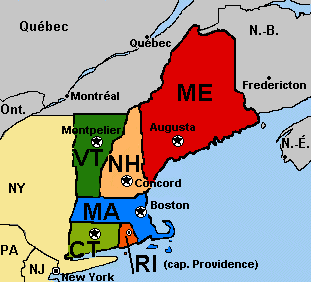|
Craig White's Literature Courses Terms / Themes |
|
|
New England |
Most Americans outside New England associate the region with "the Northeast," often including New York, Pennsylvania, New Jersey, and / or Delaware.
Historically those states are distinct from New England, but over the centuries the entire region shares resemblances: aging populations, mature economies, more community-oriented lifestyles and progressive social attitudes compared to go-it-alone individualism of the West and resentful reaction of the South.
Originally, New England was six states (or colonies) settled by English immigrants: Massachusetts, Connecticut, Maine, New Hampshire, Vermont, & Rhode Island.

Especially because of its age and relative stability, this region may seem more European than American, if "American" is defined by the mobility, individualism, and anti-government attitudes of the South and West.
States influenced by New England are the "northern tier" of progressive or liberal states, including Illinois, Wisconsin, Minnesota, and in some respects Iowa, Nebraska, Oregon, and Washington state. The New England influence occurred mostly through migration, evangelical religion, public education, and higher education.
New England literary tradition
"New England" refers to the colonies,
later states, founded by English Puritans in the seventeenth century:
Massachusetts, Connecticutt, Rhode Island, Maine, and New Hampshire.
Sometimes New York and Pennsylvania are lumped in
with New England, but historically they were founded by other groups (New York
by the Dutch, Pennsylvania by English Quakers).
Following is a very incomplete list of
writers who are associated with New England (not including NY or PA).
Aside from the first generation of Puritans, who
were born in England, most of these authors were born in New England and lived
there; a few were born elsewhere of families originally from New England; and
several are not English in descent.
Seventeenth Century:
William Bradford, Anne Bradstreet, Mary Rowlandson, Edward
Taylor, Cotton Mather, many others
Eighteenth Century:
Jonathan Edwards, John and Abigail
Adams, John Quincy Adams,
Timothy Dwight, Phyllis
Wheatley, Royall Tyler, Joel Barlow, Hannah Webster Foster, Susannah Rowson,
Prince Hall
Early
Nineteenth Century ("American Renaissance" or "New England Renaissance")
Later Nineteenth Century:
Sarah Orne Jewett, Mary Wilkins Freeman, Henry Adams, Lowell,
The Jameses, William Dean
Howells, Twain
Early Twentieth Century:
Robert Frost, Wallace Stevens, T. S.
Eliot, Marianne Moore, W. E. B. Du Bois, e e
cummings, Amy Lowell, Mary Antin
Mid-Twentieth Century:
Robert Lowell, Conrad Aiken, Elizabeth
Bishop, Jack Kerouac,
Charles Olson
Late Twentieth Century:
John
Irving, Robert Creeley, Thomas Pynchon,
Stephen King
